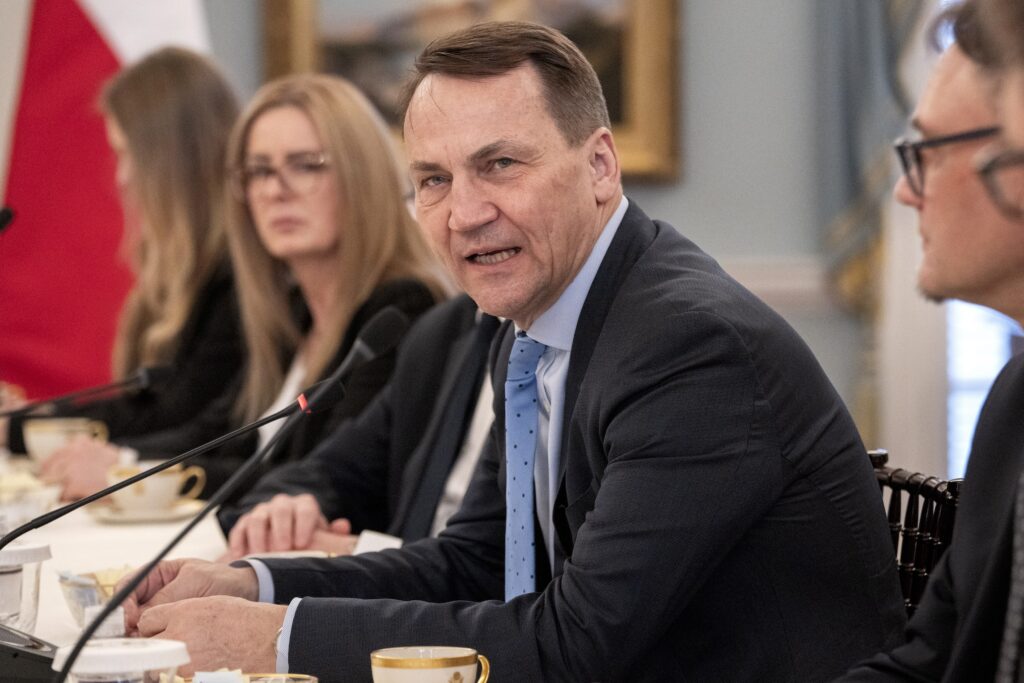
Russian President Vladimir Putin’s nuclear saber-rattling amounts to “empty threats,” Poland’s top diplomat argued during an appeal for Congress to authorize new aid to Ukraine.
“If he was to use these [nuclear] weapons, he would have to withdraw his troops from the front line, and the Ukrainians could take advantage of that,” Polish Foreign Minister Radoslaw Sikorski told the Atlantic Council during a visit to Washington, D.C. “And if he used the weapon, either on the battlefield or perhaps in the atmosphere, he would have to deal with a contaminated environment for which his army is not prepared. So actually, these, I think, mostly are empty threats that should not lead to us deterring ourselves from doing the right thing.”
Sikorski, who is married to an American journalist, prefaced his remarks by noting that their “son is actually an American soldier,” a biographical detail he foregrounded to suggest that his recommendations reflect not only a desire to ensure Polish security but also deter a war that could include U.S. troops. And he maintained, furthermore, that Western powers have the capacity to equip Ukraine for an eventual victory over Russia.
“Putin and his henchmen must realize they can neither outproduce or outlast us,” Sikorski said. “Together, we are much stronger than the enemy. Our collective GDP is vastly greater than Putin’s. The numbers speak for themselves: We have the drones, we can have the ammo, we have the money too. All that is needed to win is our will to act.”

That claim has faced growing skepticism in Western policy circles throughout the war but especially in the months since Ukrainian forces launched a much-anticipated counteroffensive that faltered well before any major breakthrough of Russia’s fortifications. Sikorski argued that Western leaders must reconcile themselves to the likelihood of “a long war,” which can lead to a Ukrainian victory as the Western defense industries increase arms production to a level that Putin can’t match.
“And let us not be fooled by the fake statistics of the Russian economy supposedly rising: GDP rises when you produce tanks and ammo, but it actually ruins your country,” Sikorski said. “So we should plan for a war that lasts a few more years. Hopefully, Russia will run out of stuff to throw at Ukraine way before that.”
The strategic situation has worsened for Ukraine since the fall, as a political standoff in Congress has thwarted President Joe Biden’s request for the funding authority to send more military equipment to Ukraine, and Russian forces have exploited a growing and substantial advantage in artillery ammunition to force Ukrainian troops to relinquish a city in eastern Ukraine.
“At this moment, only America has the military capacity and might to enable Ukraine so that she can survive this dangerous moment,” Sikorski said. “This urgent action is a lifesaving bridge. On the other side, the nations of Europe are ramping up to build a deterrence that, together with America, can contain Putin in the long run — actually in the medium term. But this year is crucial. And this year, we cannot do without America.”
Biden’s funding request has been stalled by a parallel dispute over his border security policies, which many Republicans regard as a major contributing factor in the border crisis. A version of the supplemental funding bill has passed the Senate, but Speaker Mike Johnson (R-LA) has declined to bring the legislation up for a vote in the House, where a majority of lawmakers are understood to support the bill.
“I again appeal personally to Speaker Mike Johnson: Please let democracy take its course. Please, let’s [put] this to a vote,” Sikorski said. “I think Speaker Johnson has, in the past, spoken warmly about Ukraine, and, therefore, I’d like him to know that the whole world is watching what he would do. And if the supplemental were not to pass and Ukraine were to suffer reversals on the battlefield, it will be his responsibility.”
CLICK HERE TO READ MORE FROM THE WASHINGTON EXAMINER
A well-supplied and “victorious Ukraine,” Sikorski argued, in time could follow the political, economic, and strategic trajectory that Poland has enjoyed in its rise over the last two decades to become “the fifth-largest economy in the European Union and the main buyer of U.S. military equipment” on the continent.
“If Putin were to prevail in all of Ukraine, he will do to all of Ukraine … what the then-chancellor of Nazi Germany did to Czechoslovakia: He would use the industrial, but in this case also human, resources against us,” Sikorski said. “The Ukrainians who today are resisting him would be forcibly drafted into his army. And therefore, our cost of deterring that would exponentially rise.”





